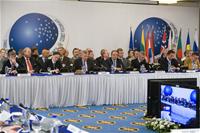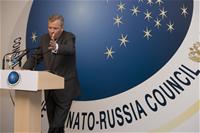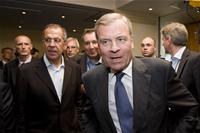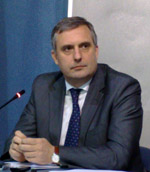Russia and NATO - the differences remain, as well as hope
Adelina Marini, June 28, 2009
 In spite of the obvious warming of the relations between Russia and the West, the differences that sharpened very much after the 6-day war in Georgia last August, still remain. This is the result of the meeting of the foreign ministers of NATO and Russia on the Greek island of Corfu on Saturday in which the Bulgarian deputy prime minister and foreign minister Ivaylo Kalfin also took part. The most important achievement of the meeting was the agreement to renew the cooperation in the field of security, frozen after the conflict in Georgia.
In spite of the obvious warming of the relations between Russia and the West, the differences that sharpened very much after the 6-day war in Georgia last August, still remain. This is the result of the meeting of the foreign ministers of NATO and Russia on the Greek island of Corfu on Saturday in which the Bulgarian deputy prime minister and foreign minister Ivaylo Kalfin also took part. The most important achievement of the meeting was the agreement to renew the cooperation in the field of security, frozen after the conflict in Georgia.
The secretary general of NATO Jaap de Hoop Scheffer said after the meeting that NATO member states share common interests in security as well as the stabilisation of Afghanistan, the  arms control, non-proliferation of WMD, including of means for their delivery, anti-drugs, anti-piracy and many other issues. For this reason at the moment member states are in the process of examining the current institutional structure of the NATO-Russia Council, and have agreed to make it a more efficient and valuable instrument for our political dialogue and practical cooperation. This statement of Jaap de Hoop Scheffer demonstrates the determination of NATO to defend its current positions, expecting Russia to join them by, in the meantime, pointing out that Georgia should not turn into an obstacle for the Russia-NATO relations.
arms control, non-proliferation of WMD, including of means for their delivery, anti-drugs, anti-piracy and many other issues. For this reason at the moment member states are in the process of examining the current institutional structure of the NATO-Russia Council, and have agreed to make it a more efficient and valuable instrument for our political dialogue and practical cooperation. This statement of Jaap de Hoop Scheffer demonstrates the determination of NATO to defend its current positions, expecting Russia to join them by, in the meantime, pointing out that Georgia should not turn into an obstacle for the Russia-NATO relations.
 The Russian foreign minister Sergey Lavrov reminded that the recognition of South Ossetia's independence is an irreversible process. The same goes to the Caucasus. Mr. Lavrov also called for recognition of the new realities and said that most NATO partners of Russia had demonstrated that they comprehend that what happened in August 2008 is irreversible. "Time is needed so that we could tackle virtual geopolitical projects which are not on the agenda right now. For now it is important that we concentrate on the practical tasks that will guarantee the stability in the Caucasus and that people there will live normally", underlined Mr. Lavrov, quoted by the "Novosti" news agency.
The Russian foreign minister Sergey Lavrov reminded that the recognition of South Ossetia's independence is an irreversible process. The same goes to the Caucasus. Mr. Lavrov also called for recognition of the new realities and said that most NATO partners of Russia had demonstrated that they comprehend that what happened in August 2008 is irreversible. "Time is needed so that we could tackle virtual geopolitical projects which are not on the agenda right now. For now it is important that we concentrate on the practical tasks that will guarantee the stability in the Caucasus and that people there will live normally", underlined Mr. Lavrov, quoted by the "Novosti" news agency.
The "New York Times" commented that the relatively conciliatory outcome of the meeting may signal improving relations between Russia and the West, a little more than a week before President Obama is scheduled to visit Moscow for a summit meeting.
In the beginning of August last year a conflict between Georgia and the breakaway territory of South Ossetia broke up. As a result Russia invaded Georgia to protect its citizens, as Moscow put it and a short war broke up that ended with a lot of tension between the two countries. Moscow proposed the events then to be thoroughly discussed on the regular session of the NATO-Russia Council right after the Georgian invasion in South Ossetia, as Russian media call it, but the Alliance blamed Moscow in disproportionate use of force and cut unilaterally the work of the Council. In response Russia froze various mutual programmes with NATO.
The relations between the two sides started gradually to warm up until April this year when Russia complained about NATO military exercises in Georgia, which wants to join the alliance. When NATO would not cancel the exercises, Russia responded by withdrawing its generals from a meeting with NATO military commanders. Soon after, NATO expelled two Russian diplomats from its headquarters in Brussels, saying that it had to punish Russia for spying against the alliance’s members. Russia retaliated by expelling two NATO diplomats from Moscow. Throughout this period, though, Russia has continued to provide logistical assistance to NATO’s military mission in Afghanistan, reminds the NYT.
Given the worsening of the situation in Iran now the new administration of president Barack Obama will rely firmly on its partnership with Russia. That is why the expectations of the summit between Obama and Medvedev in Moscow next week are very high.
 In spite of the pro-Russian behaviour of the Bulgarian government, it denounced the conflict in Georgia and also stood behind the position that Russia used disproportionate force against its neighbour. In its statement in Corfu the Bulgarian foreign minister and deputy prime minister Ivaylo Kalfin said: "Bulgaria is convinced that today's meeting is a symbolic starting point - an opportunity for the renewal of open and fair dialogue between NATO and Russia, as well as for the renewal of confidence between us", the Foreign ministry reported.
In spite of the pro-Russian behaviour of the Bulgarian government, it denounced the conflict in Georgia and also stood behind the position that Russia used disproportionate force against its neighbour. In its statement in Corfu the Bulgarian foreign minister and deputy prime minister Ivaylo Kalfin said: "Bulgaria is convinced that today's meeting is a symbolic starting point - an opportunity for the renewal of open and fair dialogue between NATO and Russia, as well as for the renewal of confidence between us", the Foreign ministry reported.